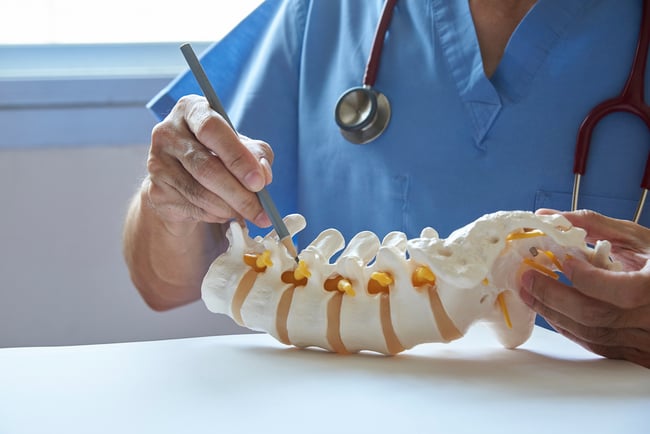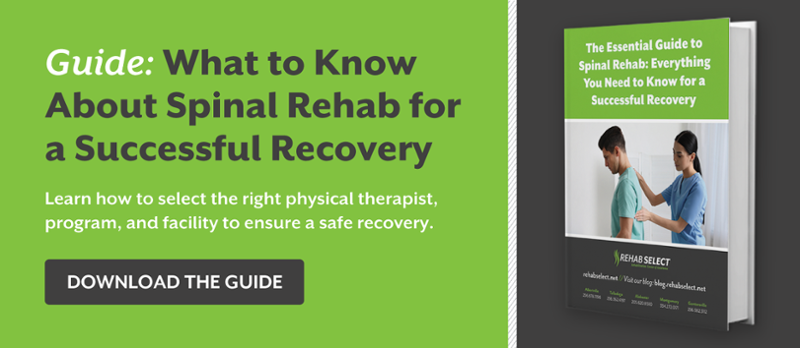
Lower back surgeries are complex procedures that require ample recovery time. As such, post-surgical patients often benefit from the kind of intensive therapy and comprehensive care that short-term inpatient rehabilitation provides. To begin preparing for the best outcome, start by understanding how long you or your loved one should set aside for proper healing. Here are some key questions to explore when planning your recovery from lumbar surgeries.
What is the recovery time for lower back surgery, what are the risks if your recovery slows down, what factors may lengthen back surgery recovery times, and how can you speed up the healing process?
Recovery after Back Surgery Depends on the Type of Procedure
Back surgery recovery times vary for different procedures. There are two main categories of lower back surgery: decompression and fusion.
Lumbar decompression surgeries relieve pain caused by nerve root pinching. During the procedure, your surgeon will remove a small amount of the bone over the nerve root or disc from under the nerve root to relieve pressure.
There are two types of decompression surgery. A microdiscectomy treats radicular leg pain (sciatica) caused by a herniated disc. A laminectomy relieves leg pain and/or weakness from spinal stenosis, often caused by changes in joints, discs, or bone spurs.
Lumber fusion surgeries treat pain and disability caused by lumbar degenerative disc disease or spondylolisthesis. During the procedure, your surgeon may use a bone graft to eliminate motion at a painful vertebral segment.
Lumbar Decompression and Back Fusion Surgery Recovery Time
Recovery after back surgery depends on your fitness and activity level before the procedure and the complexity of the surgery. Your surgeon may recommend physiotherapy before the operation to help shorten the recovery time.
Here’s a synopsis of average back surgery recovery times, according to Medical News Today:
Most people can and are encouraged to walk around unassisted within a day of the operation. You'll likely be well enough to leave the hospital one to four days after the procedure.
You may resume driving and light activities in two weeks and routine activities (e.g., work, school) after four to six weeks—depending on your symptoms and the severity of your condition. You should avoid strenuous labor and contact sports for 12 weeks or longer.
Decompression surgery can be performed with minimally invasive techniques. The small incisions can minimize discomfort and allow you to return to work faster.
The Risks of Slow Recovery After Lower Back Surgery
A slow recovery from lumbar surgeries prevents you from resuming normal activities while increasing the chances of developing complications, so it’s important to have a plan to mitigate risks. Post-surgical inpatient rehab provides an option for a faster and more complete recovery while reducing the risks for post-surgery complications and injuries.
Inactivity can increase risks, including the possibility of deep vein thrombosis (DVT.) The blood clot in the leg can travel to the lungs and lead to pulmonary embolism. That's why medical professionals recommend patients start moving as soon as possible after their surgeries to speed up recovery.
Also, slow recovery may increase the possibility of cerebrospinal fluid (CSF) leaking out of tears in the membrane surrounding the spinal cord, leading to symptoms such as dizziness, headaches, and seizures.
Slow or poor recovery can increase the likelihood of infection at the surgical site and lead to recurring symptoms, such as chronic pain. It may also cause damage to the nerves, muscles, or tendons that stabilize the spine.
What Can Slow Down Back Surgery Recovery Times?
Various factors can affect how quickly you recover from back surgery. Avoiding the risk factors can help you better manage your healing process and get back to normal activities sooner. Here are some behaviors and conditions that can slow down your recovery:
- Smoking or using nicotine products
- Obesity
- Osteoporosis
- Chronic illnesses, such as diabetes
- Malnutrition
- Depression
- Prolonged opioids usage
- Prednisone medication usage
- Not adhering to your medication plan
- Failure to care for the incision site
- A sedentary lifestyle
- Bending, lifting, or twisting too soon after the operation
How to Speed Up Recovery After Back Surgery
You may be asking: What is the recovery time for lower back surgery, and how can you expedite the process? Recovery from back surgery takes time, but there are many things you can do to make your recovery faster and more comfortable:
Seek Appropriate Pain Management
Reducing pain during recovery can support physical and emotional healing. Besides pain medications such as narcotic pain pills, anti-inflammatory drugs, and Tylenol, you can also use ice and heat to ease the pain. (NSAIDs, such as Advil, are not recommended because they inhibit bone formation.)
Improve Your Sleep Quality
Pain management can help you sleep better, which promotes healing. You can also experiment with various sleeping positions to find the one most comfortable for you to rest better. You may use an adjustable bed or supportive pillows to elevate your upper body and put pillows under the back of your knee to relieve pressure on the spine.
Engage in the Right Amount and Type of Activities
While you shouldn't stay sedative after your operation, don't engage in strenuous activities too soon. Striking the right balance is key to recovery. Don't lift heavy items or push through fatigue as they may lead to reinjuries and potentially a second surgery. Start with short walks the first few days after the procedure and gradually build up your activity level.
Inquire about Post-Operative Bracing
Wearing a brace can help speed up healing and recovery in some cases. Depending on your condition, your surgeon may recommend a soft elastic corset brace or a rigid plastic custom molded orthosis.
Support Recovery after Back Surgery with Inpatient Orthopedic Rehabilitation
When you're recovering from back surgery, you need support from a team with extensive experience in lumbar spine injuries and knowledge of the latest spinal care treatment.
Inpatient orthopedic rehab can help you regain strength and range of motion under the guidance of experienced therapists who provide around-the-clock care and assistance with the activities of daily living. A coordinated care team can show you how to perform strengthening exercises and stretching routines to enhance the healing process and reduce the chances of reinjuries.
Looking for spinal surgery recovery in Alabama? Rehab Select offers inpatient post-surgical orthopedic rehab to help shorten back surgery recovery time while improving your treatment outcomes. Schedule a tour to see how we can be part of your healing journey.





